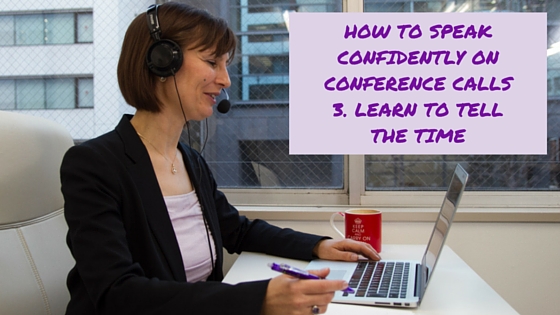Participants in my working globally workshops often raise the issue of the time difference for conference calls with the U.S. and Europe.
Unfortunately, colleagues in those regions sometimes seem to forget about or be unaware of the time in Japan.
Or maybe they are aware, but continue to schedule calls at inconvenient times for those based in Japan because no one raises the issue.
That’s why I suggest learning to “tell the time.”
What I mean is, make the time difference clear to your overseas colleagues and maybe schedule some calls differently rather than putting up with persistent late-nighters.
You might be thinking, “Oh, but I don’t want to complain to my colleagues. I have to put up with it because it’s part of working in a global business environment.”
Maybe – if it’s just the occasional call. But if you regularly have late-night calls that disrupt your sleep, they will affect your health, mood, and productivity over time.
Workshop participants tell me they find it difficult to concentrate because they’re exhausted at the end of a long working day, and as a result, they’re not able to contribute their best to late-night calls.
And when your performance isn’t what it could be, your confidence takes a knock.
Sound familiar? So what can you do about it?
Three Steps for Telling the Time with Conference Calls
-
Say your name and location
When I speak on conference calls, I say, “This is Helen in Tokyo.”
This helps raise awareness about locations. Plus it helps you establish your presence and avoid awkwardness if two people start speaking at once.
I suggested this in one workshop, and a participant said, “Oh, that’s a good idea. I’d been on regular calls for six months before someone realized that I was in Tokyo. They thought I was in Europe.”
As your colleagues become more aware of your location, they may be more open to scheduling differently.
-
Schedule differently
If calls are with, for example, either North America or Europe, you could suggest taking turns with the less convenient time. If you don’t speak up about it, your colleagues may not realize what you’re putting up with.
If calls across the three regions of North America, Europe, and Asia are common, check whether you could replace some of those calls with speaking to just one region – North America or Europe, rather than both.
As well as enabling you to schedule at a more reasonable time, this can also give you an opportunity to get to know remote colleagues better and improve working relationships.
-
Record the call
Many conference call systems have a recording function, so you can take advantage of this by asking your colleagues to record late-night calls for you.
Granted, this doesn’t give you the opportunity to speak up immediately, but you can still email comments after listening to the recording or even send a video or voice recording of your own. You may be able to make a better contribution than if you’d joined the call exhausted.
Tell the time and take advantage of technology rather than suffering because of it.
* * * * *
I hope you’ve enjoyed this three-part post on dialing in early, speaking early, and learning to tell the time to help boost your confidence on conference calls.
Learn more about telephone conference calls, meeting facilitation, presentation skills, listening and questioning, and dealing with conflict in the book 英語の仕事術 (Eigo no Shigoto-jutsu).

Thanks, TopTia, for the blog photo.
Do you want to communicate clearly, confidently, and convincingly in your online meetings and presentations? In the brand new self-study course Speak Like An Expert Online, you’ll learn how to
- Analyze your audience to be sure your message matters to them
- Overcome nerves, so that you can speak clearly and connect with your audience
- Structure your communication to make it easy to follow
- Make the most of your body language and voice to engage your audience and clarify your points
- Design and deliver PowerPoint slides that clearly support your message instead of confusing your audienceand more
and more!
Discover all the ways Speak Like An Expert Online can help you here.


